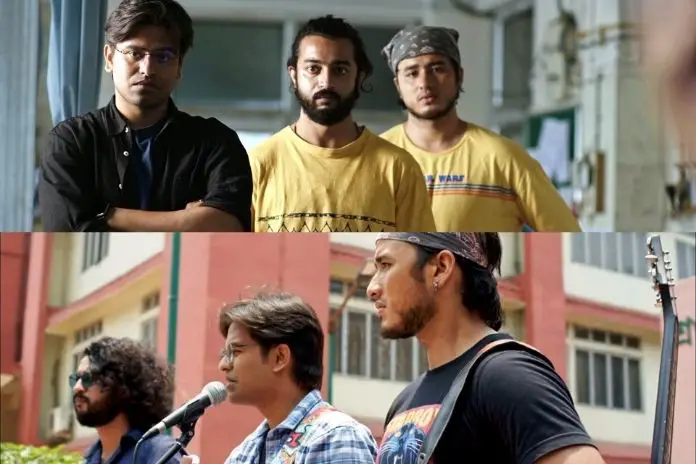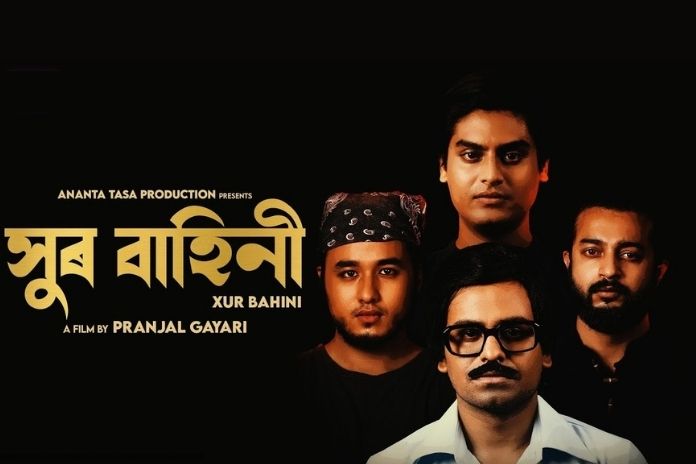Director Pranjal Gayari’s much hyped new short film on Jayanta Hazarika finally released on YouTube recently. The short film Xur Bahini takes its name from a social initiative led by the yesteryear music star of Assam in the seventies to help people in times of crisis. Exploring two narratives of the past and the present, the film tends to connect to this idea of social responsibility and runs on a similar thread of evoking a desire for the greater interest of the society that is beyond the satisfaction and fulfillment of personal goals.
The promotional materials of the film were highly misleading as the film is not about the late musician but a small band who finds a source of inspiration in his efforts. However, it’s only after watching the short that one can realize, it is not about his efforts either but how the ‘spirit and ideals’ behind those ‘efforts’ of bringing people together inspired a band from falling apart.
Xur Bahini is a timely homage to an artist of fame where his art isn’t the source of fascination but the ‘desire’ for a change that helped shape up his voice. It is a movie about Jayanta Hazarika without being a movie about Jayanta Hazarika. And thus, in doing so, it is able to break free from the current trend of biopics.
Told through the story of a young band of four and their confrontation with a harsh reality of life is a small story of how they go about looking back to this one personality who had wholeheartedly dedicated himself for the cause of society. So rather than Jayanta Hazarika, it is his ‘defiant spirit’ that comes alive in this inspiring short. The approach of the film to tell the story in the way it does is its biggest merit. But in a story of inspiration, how the band is inspired we are never shown. We only see what happens after being inspired. So in its merit also lies its demerit.
The shifting time of the narrative is evident from the trailer itself and is dominant to a reasonable aspect of the story. But the first few minutes of the film are just slideshows in auto transition that negotiates for a necessary build up. It owes this to some visible inconsistencies in the writing which can only be assumed as a shortcoming born out of its short run time. We are here now and there now and back here again. Only fade in and fade out as means to draw up conversations to achieve the end of introducing Jayanta Hazarika to the situation.
The film, however, does achieve the sustaining stability once the point is established and the story shifts to the 1970s to present us a pained and troubled look at Jayanta Hazarika in conversation. This sequence is the heart of the film and the glory is attributed to its aesthetic qualities and actor Kamal Lochan’s prowess in portraying the character. He pitches in a subtle but strong accomplishment in just under four minutes and the camera clearly loves his work.

The film registers another plus with its cinematography. There are two key scenes where the composition lays bare the conflict of the two characters in the film. One of them is a shot in the observation chamber of the hospital in which Kamal Lochan precedes the sequential order followed by Prayash Sharma Tamuly and Nirupom Saikia behind him as they watch over their friend. It justifies the distance and emotional connect of the characters to the situation. Then there are strategically placed arc shots that intensifies the narrative when Kamal Lochan is in conversation with Luchiyana Das in one scene, and revealing a shade of the character’s personality while delivering a speech in another.
The film also features a beautiful nod to Abbey Road as the characters walk across a pedestrian crossing. It works both literally and figuratively as the band members face emotional crossroads and despite being at odds with each other follows the lead.
The conflict of both the past and the present differs. While Jayanta Hazarika’s was of socio-political in nature, the challenges our characters face in the present are inherently personal to their band. But the approach to arrive at a solution remains the same which is faith in a sense of optimism in a down beaten world. Through a fictional underdog story, Xur Bahini offers a musical tribute to the efforts of Jayanta Hazarika without featuring the man with his ‘guitar’ but his ‘ideals’. The idea of the short film that the driving force behind Hazarika’s choices could inspire people even today makes it up as a rich tribute to him.
Watch the film here

